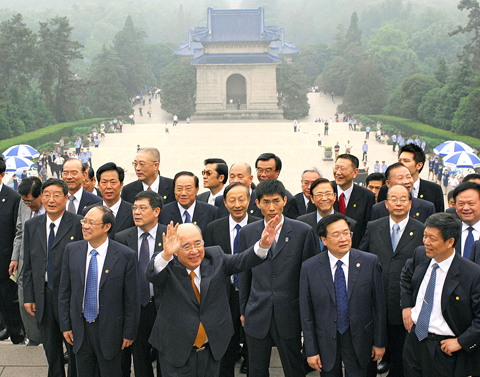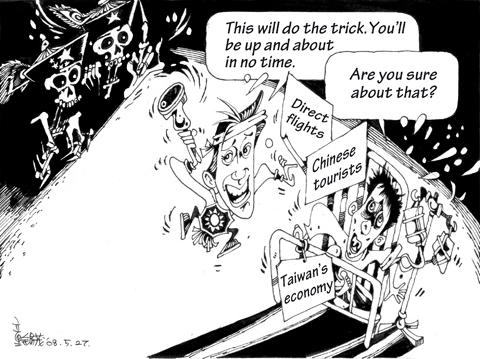DPP
condemns Wu's comments
TITLE TATTLE: The DPP legislative caucus took umbrage at KMT Chairman Wu Poh-hsiung calling President Ma Ying-jeou simply 'Mr' at a banquet on Monday night
By Jimmy Chuang
STAFF REPORTER, WITH AGENCIES
Wednesday, May 28, 2008, Page 1
 |
|
Chinese Nationalist Party (KMT) Chairman Wu Poh-hsiung waves to residents as he leads a 16-member delegation on a visit of the mausoleum of KMT founder Sun Yat-sen in Nanjing yesterday.
|
The Democratic Progressive Party (DPP) yesterday urged the
Chinese Nationalist Party (KMT) to stop flattering China by sacrificing Taiwan's
sovereignty and the legal rights of its people.
“KMT Chairman Wu Poh-hsiung (吳伯雄) addressed President Ma Ying-jeou (馬英九) as ‘Mr.
Ma’ during a banquet with Chinese Communist Party [CCP] officials on Monday
night. This kind of behavior has me worried that he may have forgotten about
Taiwan and its 23 million people,” Legislative Whip William Lai (賴清德) told a
press conference.
He said the DPP was opposed to the KMT-CCP’s party-to-party communications
because the rights of Taiwanese could easily be sacrificed.
“Any decision-making that concerns a country and its people must be supervised
by the public,” the caucus whip said.
Lai’s comments were echoed by DPP Legislator Chai Trong-rong (蔡同榮), who said the
US would never assign a party chairman to negotiate with a foreign country on
behalf of the government, because a political party’s concerns could never
reflect all US citizens’ concerns.
Meanwhile, Kaohsiung Mayor Chen Chu (陳菊), another a DPP member, voiced her
concern about Wu’s trip, saying he had made a “hasty” decision to visit China
before the new government had had the opportunity to fully assess public
opinion. She urged the KMT to insist on Taiwan’s sovereignty while protecting
people’s interests during the KMT delegation’s trip.
However, Deputy KMT caucus Secretary-General Wu Yu-sheng (吳育昇) downplayed the
implication of Wu Poh-hsiung referring to Ma as “Mr” on Monday night.
Wu Yu-sheng said the KMT chairman’s comments reflected his intention to “put
aside controversies and ensure mutual respect” for both sides of the Taiwan
Strait.
Wu Poh-hsiung paid homage at Sun Yat-sen’s (孫逸仙) Mausoleum in Nanjing yesterday,
saying both the “mainland” and Taiwan belong to the Chinese nation and are
“closely tied by blood,” which no one could obliterate. He said the KMT has
promised to make the welfare and interests of the people of Taiwan its top
priority because the people gave the KMT its election victories.
Wu Poh-hsiung said his delegation chose Nanjing as their first destination in
China because it was the former seat of the KMT government and therefore had
unique significance to the KMT historically and emotionally.
Noting that Sun was respected on both sides of the Taiwan Strait, the KMT chief
said that every KMT delegation visiting China goes to Sun’s mausoleum.
He said that he had gone there when he visited as KMT vice chairman after the
party lost power to the DPP in 2000.
“I felt really ashamed in front of Sun [then],” he said.
Sun’s soul should be comforted by the KMT’s return to power, he said.
He said it would be easier for KMT members to visit Nanjing in the future,
hinting that they would be able to take direct flights from Taipei.
Wu Poh-hsiung invited Nanjing residents to travel to Taiwan after his visit to
Sun’s mausoleum attracted a lot of local attention — and shouts of “Go” and
“Peaceful unification.”
He laid a floral wreath next to the statue of Sun and observed a minute of
silence.
Later in the day Wu flew to Beijing, where he is scheduled to meet Chinese
President Hu Jintao (胡錦濤) today.
Wu said yesterday he hoped the vision shared by former KMT chairman Lien Chan
(連戰) and Hu during their meeting in 2005 could become reality.
The two planned to facilitate the resumption of bilateral negotiations, end the
state of hostility, sign a peace accord and establish a mechanism for economic
cooperation.
Wu said it was his party’s responsibility to the peoples on both sides of the
Taiwan Strait to materialize these five wishes.
He made the remarks while meeting Jia Qinglin (賈慶林), head of the People’s
Political Consultative Conference, in Beijing yesterday evening.
He thanked Jia for attending the past three cross-strait economic forums and
making an effort to push the peaceful development of cross-strait ties.
|
|
| GOLDEN CANOPY A man rides his bicycle with a passenger along blossoming trees on Singda Road in Taichung City yesterday.
|

Ma's peace
talk just the beginning
By Edward Chen 陳一新
Wednesday, May 28, 2008, Page 8
In his inaugural address last Tuesday, President Ma Ying-jeou (馬英九) sought to
sweep away eight years of gloom and to set a cautious, yet optimistic,
foundation for three-way relations between Taiwan, China and the US. But while
Ma has bid farewell to the past, new and difficult problems have emerged.
Through a multi-layered strategic approach in his inaugural speech, Ma used
security and trade relations between Taiwan and the US as backup and the
potential for another power transfer as bargaining chips in an attempt to seek
cross-strait negotiations with Beijing on highly sensitive issues such as the
threat of Taiwan’s marginalization in the economic integration of Southeast Asia
and its shrinking international space. At the same time, Ma utilized the
improvement in cross-strait relations as a leverage for engaging in talks with
Washington on intellectual property rights enforcement, import of US
agricultural products and weapon sales to Taiwan.
Although Ma once again mentioned direct cross-strait weekend charter flights and
allowing more Chinese tourists to visit Taiwan, he said this would hinge on
whether Taiwan and China could move into a new era. He also appealed to Beijing
to consider the fact that both nations are largely composed of ethnic Chinese —
a tactic that is both forceful and compliant.
With full knowledge that Beijing would not respond in the short term, Ma still
offered reconciliation as the objective of his cross-strait effort, saying that
Taiwan would become a harbinger of peace, thereby implying that former president
Chen Shui-bian’s (陳水扁) government was a harbinger of trouble — again combining
force and compliancy.
The problem is, we cannot control how Beijing and the US will respond. Will
Beijing maintain a passive position during long-term cross-strait negotiations?
Can the Chinese authorities only give without asking for anything in return?
Ma has said that Taiwan’s relationship with the US as a trade partner and a
security ally must be strengthened, that an adequate defense budget is needed
and defensive weapons must be purchased. He has also said that a resumption of
dialogue with Beijing should be built on the so-called “1992 consensus.” No
doubt all these statements set Washington’s mind at ease.
However, it was the Chinese Nationalist Party (KMT) that opposed numerous weapon
purchase bills during its term in opposition. The US has also refused to sell
F-16C/D aircraft to Taiwan for political considerations, did not support the
development of the Hsiung Feng IIE anti-ship missile and was in two minds over
the sale of submarines.
The situation has changed. Will Ma and the administration of US President George
W. Bush consider new measures once trust between Taiwan and the US has been
restored?
If Taiwan, faced with China’s superior military power, does not develop or
purchase the necessary defensive weapons, how can it strengthen its national
defense and negotiate with Beijing from a position of confidence? The US and
Taiwan still have different view of what constitutes essential defensive
weapons, and these differences must be resolved.
In his inaugural speech, Ma said nothing about signing a free trade agreement (FTA)
with the US. Coincidentally, US Deputy Secretary of State John Negroponte did
not mention it either when testifying before the US Senate Committee on Foreign
Relations earlier this month, showing that the two parties have not reached a
consensus on this issue.
The problem is if the Bush administration is unwilling to set an example by
negotiating an FTA with the Ma administration, how can Taipei expect Beijing to
allow the ASEAN to negotiate such a deal with Taiwan?
As for Taiwan’s highly sensitive bid to gain observer status in the World Health
Assembly (WHA) — the WHO’s top decision-making body — Negroponte did show his
support. Still, without Beijing’s approval, Washington’s support is nothing but
empty words. During the Democratic Progressive Party government’s rule,
Beijing’s obstruction of Taipei’s bid created a lot of public discontent. If Ma
fails to bring Taiwan into the WHA within the next few years, he will have a
problem explaining his failure to Taiwanese voters.
Cold War thinking is causing Washington to worry that cross-strait unification
may be unfavorable to US national and strategic interests. Post-Cold War
thinking also implies that annexation is unlikely owing to tensions and
confrontation between these two major powers. However, Taiwan’s economic and
trade integration with China and the Southeast Asian region is inevitable. How
will Taiwan, China and the US deal with this trend? This deserves more attention
in future.
Edward Chen is a professor in the
Graduate Institute of American Studies at Tamkang University.